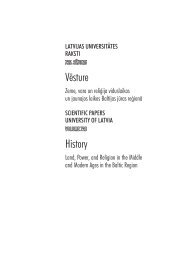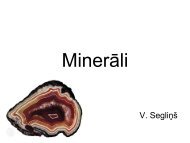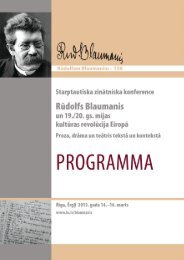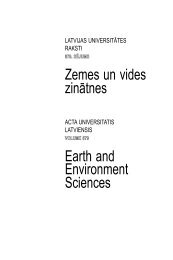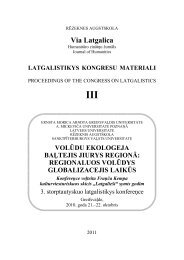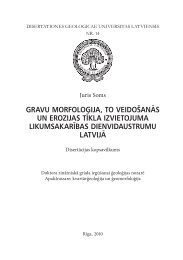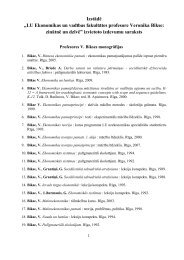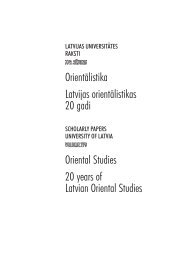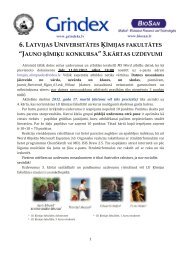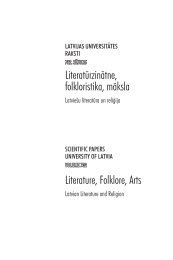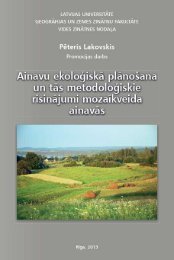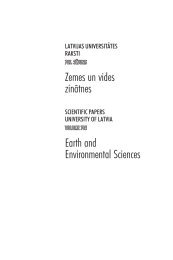Untitled
Untitled
Untitled
You also want an ePaper? Increase the reach of your titles
YUMPU automatically turns print PDFs into web optimized ePapers that Google loves.
206 LITERATÛRZINÂTNE, FOLKLORISTIKA, MÂKSLA<br />
of that period had sufficient grounds for optimism and that their rationalistic project<br />
was perfectly justified1 . The picture of the Enlightenment culture in Ackroyd’s novel<br />
is very different. In his novel Peter Ackroyd gives expression to the views of the<br />
thinkers who espouse the ideas of the Enlightenment philosophy and juxtaposes them<br />
with the views of their opponents, thereby creating a polyphonic text. Hawksmoor<br />
deals with the world visions of the English scientists and mystics at the beginning of<br />
the eighteenth century. In Ackroyd’s novel the rationalistic philosophy of the English<br />
Royal Society is contrasted with the ideas of gnosticism and mysticism. However, it<br />
is not a truly dialogic text in Bakhtin’s sense of the term as the part of the book relating<br />
the construction of the seven churches by the diabolical architect, who makes<br />
human sacrifices, is a first–person narrative privileging the position of the narrator<br />
over that of his opponents.<br />
By the beginning of the eighteenth century the Enlightenment had become the<br />
dominant trend in the leading intellectual circles of Europe. One single human<br />
faculty – Reason – was celebrated and glorified at the expense of all the others. 1 It<br />
was believed that the natural light of reason was capable of illuminating the darkest<br />
corners of the world and of human nature. Reason would reveal all the mysteries of<br />
the human and material world and lay the foundations of natural religion, natural morality<br />
and natural law. The Enlightenment philosophers thought that once reason and<br />
knowledge became widespread, humanity would make great progress and irrationalism<br />
and ignorance would be eliminated.<br />
In Ackroyd’s novel there is a continual dialogue between Wren, the chief advocate<br />
of the new materialistic, mechanistic and experimental natural philosophy based<br />
on observations, measurements and mathematical calculations, and Dyer, who is a<br />
mystic espousing an eclectic doctrine similar to Gnosticism. Dyer feels great contempt<br />
for the rationalistic philosophers who tended to explain both physical and human<br />
nature in mechanistic and materialistic terms.<br />
Dyer’s extremely traumatic childhood experience led him to doubt the rational<br />
and orderly structure of the world of which the representatives of the new science<br />
were convinced. While the Enlightenment thinkers believed that human nature was<br />
also governed by harmonious laws and that man was reasonable, Dyer perceived<br />
human nature as degenerated. For him people are “the Heirs of Hell and Children of<br />
the Devil” 3 and “Human life is quite out of the Light and … we are all Creatures of<br />
Darknesse” 4 . His experience of the Plague and the Great Fire of London made him<br />
doubt that the world was orderly and harmonious, that it was designed and built by<br />
the Creator along rational lines and that it operated according to the immutable laws<br />
of mechanics. He believes that there is very little, if, indeed, any, order and harmony<br />
in the universe or in human nature. For Dyer the world is fearful and “Humane life<br />
was of no certain course” 5 . In other words, it is certainly not governed by reason.<br />
Consequently he rejects the rationalistic and mechanistic philosophy, which constituted<br />
the dominant mode of thinking of his age, and adheres to the dualistic, Gnostic<br />
mystical teaching of a secret society into which he was initiated when he was still a<br />
child. It sees man as an unchangeable evil and teaches that all men are damned. Christianity<br />
is rejected because it is hollow – it has been emptied of all its mysteries and<br />
miracles. Everything is given a rational natural explanation. Mysteries are abolished



